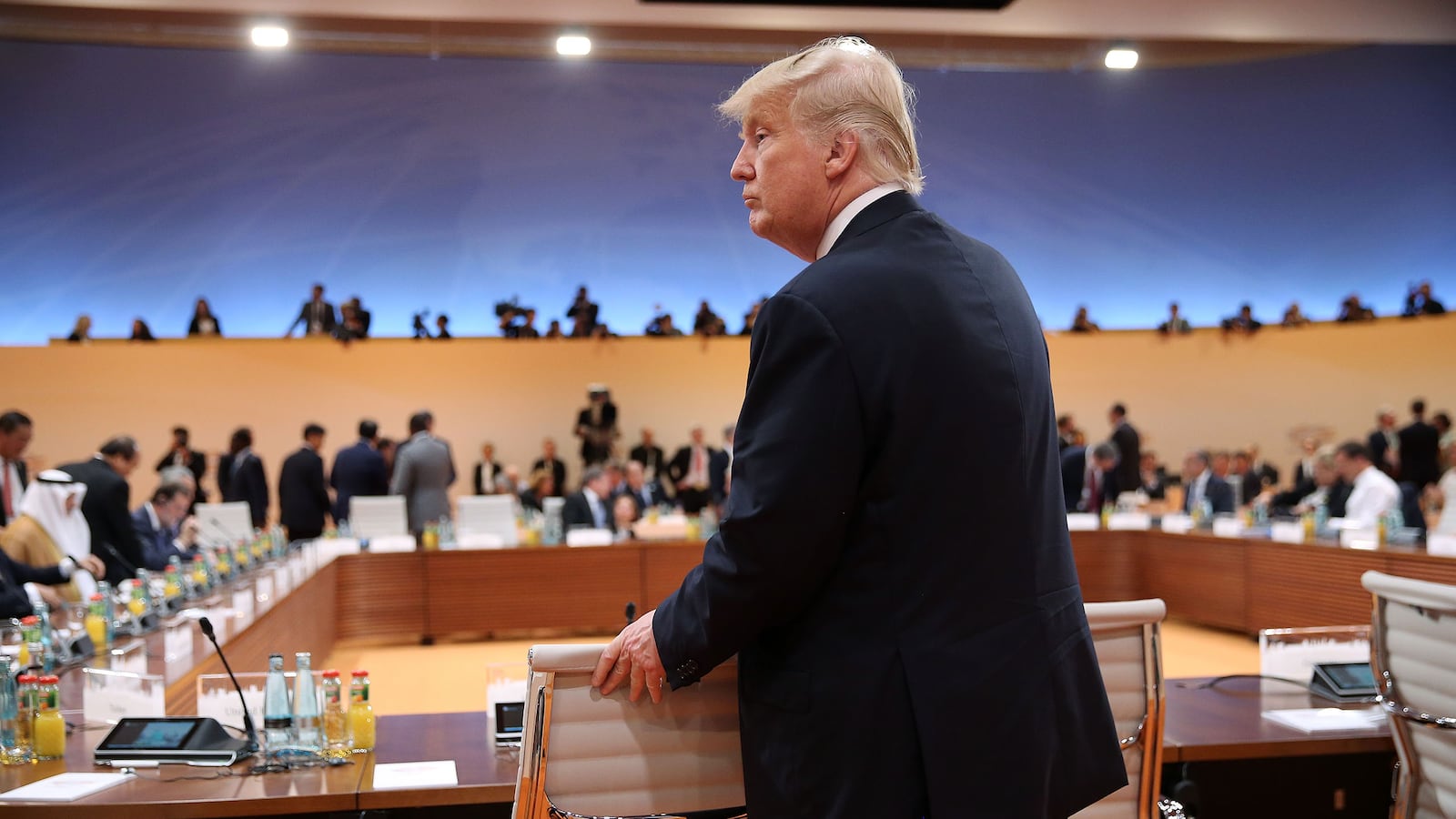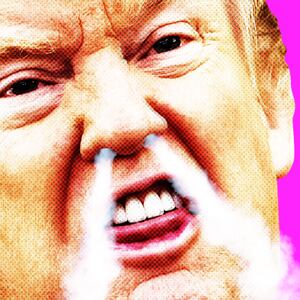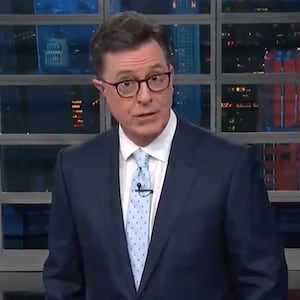Donald Trump looked forward to traveling to Argentina for the G-20 as much as he’d look forward to a root canal operation or a migraine headache. He hates traveling, foreigners, and multilateral diplomacy; as a creature of habits, he’d much rather be spending the weekend at Mar-a-Lago, his golf club in New Jersey, at Trump Tower, or frankly anywhere else.
But don’t be fooled. These G-meetings (add your favorite number)—the process fuel that powers the international liberal order—are gatherings that Mr. Trump loves to hate.
Indeed, if these meetings didn’t exist Trump would have to find some way to create them because they serve his political interests and play to his vainglory. And this one, with its mix of combustible characters and issues and potentially embarrassing moments, should be a doozy. Trump wouldn’t miss it for the world. As you watch the president this weekend in Argentina, think about the reasons why.
A Stage to Strut
Anyone who thought, based on his campaign slogan of “America First” that Trump would be a president focused on domestic matters wasn’t thinking clearly. To quote the Bard, “all the world’s a stage”—and for a narcissist with a galactic ego, the need to compensate for insecurities as deep as the Grand Canyon, and a preternatural desire to undo most of the foreign policies of his predecessor, the world might not have been quite big enough.
Clearly, he prefers the big bilats where he can go mano-a-mano and not face a gang of seven or 20. (See his performances with Putin in Helsinki and Kim Jong Un in Singapore). And sure he hates the multilaterals with their boring speeches, dull diplomatic double-speak, and lengthy communiques.
But instead of boycotting these gatherings he reshapes and hijacks them for his own purposes as he did at the most recent NATO meeting, creating a nonexistent problem by threatening the integrity of the alliance over allied defense spending and then reaffirming support of NATO at the G7 meeting in June in Canada after erroneously claiming he had forced allies to pony up bigger defense budgets.
Think of these gatherings as episodes in a reality television show with Trump presiding. His interlocutors are nothing more than foils where he can play out his campaign promises and personal prejudices against multilateralism and parade an AmericaFirst or Only message before his delighted base.
A Global Order to Wreck
As many experts have noted, Trump has taken a wrecking ball to the rules, norms, alliances, and institutions America constructed after World War II (aka the liberal international order, or LIO)—one that has redounded to the enormous benefit of the U.S. and most of the world. But in Trump’s bizzaro world the institutions are run by corrupt, power hungry globalists (it takes one to know one), the trade rules have been rigged to empty the U.S. of jobs and money, the alliances run against the grain of his unilateralist nationalism, and it’s pretty obvious what he thinks of democratic norms and principles.
America cannot be great again, in Trump’s dystopian world view, if the icons of the LIO are not smashed into pieces—or at least compelled to do America’s bidding by agreeing to renegotiate the terms of traditional arrangements (see NATO burden-sharing, trade wars with Europe or China, and NAFTA renegotiation). In the Trumpian world, winning the transaction is everything; values, trust, cooperation, unity, and benefits of alliances take a back seat or no seat at all.
Allies to Annoy
Trump almost never passes up an opportunity to piss off America’s traditional allies in Europe, the Asia-Pacific region, and the Western Hemisphere. At global gatherings of the world’s most powerful countries, he has been the proverbial skunk at the garden party refusing, for example, to sign on to summit communiques even after they have been turned into mush to mollify Trump.
He also relishes tossing grenades at these confabs. Who can forget his petulant performance at the June G7 summit in Canada, when he threw candy at German Chancellor Angela Merkel while saying “don’t say I never give you anything” and blasted Canadian PM Justin Trudeau in a Twitter tantrum after the meeting for being weak and dishonest.
Trump has convinced his base that America’s allies have ripped us off in trade deals and let Uncle Sucker pay too much for their defense. Sticking his finger in the eyes of allies is tossing red meat to all of his cultists.
And Strongmen to Court
It’s stunning to consider how much of Trump’s international diplomacy has been focused on the Strongmen’s Club (Democratic leaders need not apply). And while it’s fair to say that you make peace with your adversaries not your friends, Trump prefers the company of tough guys who don’t have to answer to the rule of law, a free press, caterwauling critics, or annoying democratic constituencies.
He praises these dictators and despots, remains silent in the face of their egregious human rights records and murderous activities at home or abroad and generally gives them a cosmic pass on anything that doesn’t concern Trump’s agenda—hidden or otherwise—at a given moment.
His preternatural unwillingness to personally criticize Putin really does suggest that the Russian leader has some kind of leverage over Trump of a personal or business nature; his propensity to gush over Kim Jong Un without any seeming awareness of his brutal depredations at home; and his recent decision to give Saudi Arabia’s Mohammed bin Salman (also known as MBS) a pass on the murder of Washington Post columnist Jamal Khashoggi are stark and stunning displays of his love—perhaps even envy—for authoritarians.
G-20: Gathering of Gatherings
A normal President might be looking at the G-20 in Argentina with some trepidation. The mix of personalities and issues is highly combustible and the choices of who to see and what to say fraught with risk, complexity and even embarrassment. Not Donald Trump.
We can’t read his mind. But it’s more than likely that he’s looking forward to a gathering where he will be the center of attention and in many respects the focal point of whatever of consequence occurs.
Just consider the cast of characters and issues at play. The can’t-miss show, now that Trump has cancelled his meeting with Putin, is the hyped up Trump-Xi meeting Saturday night, where the two will discuss the ongoing trade war. And of course everyone will have to stay tuned to whether the president will meet with MBS, the pariah prince whose role in the murder of Khashoggi has dominated the headlines.
Whatever transpires in Argentina, in Donald Trump’s mind the G-20 will very much be his summit and he will, as always, do everything he can to steal the show and the highlights reel.
None of his meetings are likely to produce any dramatic results. But in Trump’s view, in the end that really doesn’t matter. The medium—Mr. Trump—is the message. And this weekend all roads will lead to perhaps the first president in American history who, both at home and abroad, cannot seem to turn the M in Me upside down to make a We.
Aaron David Miller, a vice president at the Woodrow Wilson International Center for Scholars and a former State Department adviser and Middle East negotiator, is the author of The End of Greatness: Why America Can’t Have (and Doesn’t Want) Another Great President. Follow him on Twitter: @aarondmiller2.
Richard Sokolsky, a non-resident senior fellow at the Carnegie Endowment for International Peace, was a member of the Secretary of State’s Office of Policy Planning from 2005 to 2015.








